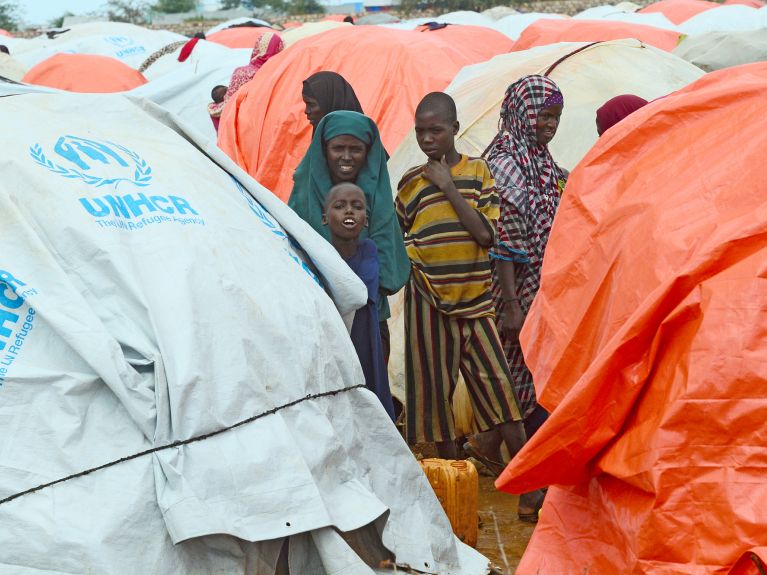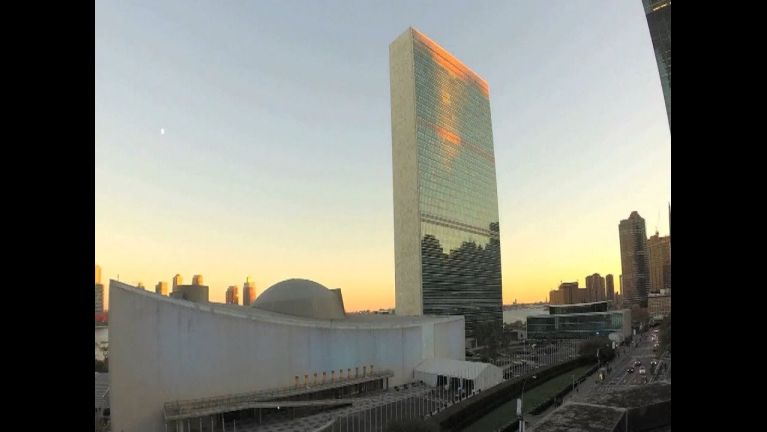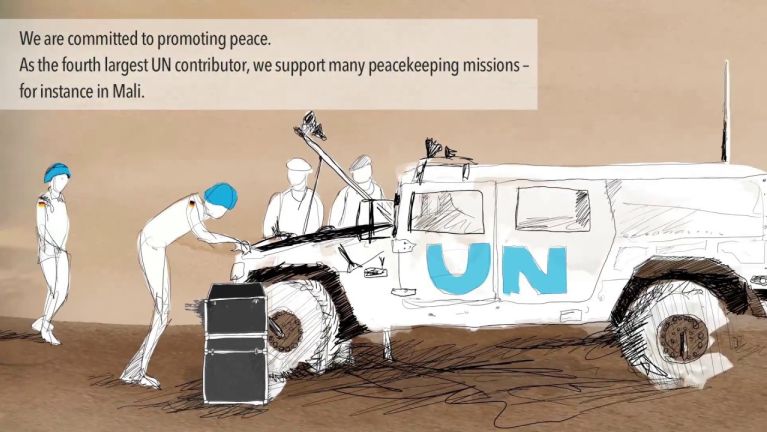Working together against war and suffering
International cooperation plays an important role in German foreign policy. Germany’s commitment to the United Nations

Going it alone in international politics is not an option for Germany – it very consciously decided against that because of lessons learned from its own past. Today the country is tied into a close network of international organisations, programmes and conventions. The United Nations (UN) remain the most important hub of multilateral action. Founded by 51 countries in 1945, it currently has 193 members. In 1973 the Federal Republic became a member of the UN, as did the then still existing German Democratic Republic (GDR). Federal Chancellor Willy Brandt made the following comment at the time of accession: “In a world in which we are all increasingly dependent on each other, a policy for peace must not stop on our own doorstep.”
That applies as much today as it did then – despite or precisely because of the many ongoing crises in the world. That is why at the beginning of 2017, during his first visit to the United Nations as German Foreign Minister, Sigmar Gabriel said: “Germany is a country that considers international cooperation the only way to avoid war and suffering.”
Five questions and answers about the relationship between Germany and the United Nations.
What role does Germany play in the United Nations?
Germany is one of the mainstays of the international system. This is not only because its foreign policy is clearly oriented towards peaceful cooperation and the rule of law, but also because of its extensive, and also financial, contributions to the UN system: after the USA, Japan and China, it is the fourth largest contributor responsible for a 6.4% share of the regular budget. It also ranks fourth with regard to the budget for peacekeeping missions and is thus contributing over 1.3 billion US dollars to both budgets in the 2016/2017 period. However, Germany is not one of the five permanent members of the Security Council, the United Nations body with primary responsibility for international peace and security.
Why doesn’t Germany have a permanent seat on the UN Security Council?
The United Nations was founded after the Second World War to save future generations from another human and ethical catastrophe like the one caused by the German Reich. That is why Germany was not among the founding members or the countries with power and influence within the UN. Since that time, however, international relationships have changed. That does not only apply to Germany, which has developed into a peaceful and economically strong country at the centre of Europe. African and Latin American countries do not have a permanent seat on the Security Council either. That is why the great majority of UN member states think that a reform of the Security Council is required.
Would Germany be interested in a permanent seat?
Together with its so-called G4 partners – Brazil, India and Japan – and many other reformist countries, Germany supports a reform of the Security Council in the near future to appropriately reflect relationships in the world today. This should involve an expansion to include new permanent and non-permanent seats. Germany regards itself as a candidate for a permanent seat. It has already participated in the Security Council five times as a non-permanent member for two years and is applying for a sixth time for the years 2019/2020. The campaign for this has already begun.
Dieses YouTube-Video kann in einem neuen Tab abgespielt werden
YouTube öffnenThird party content
We use YouTube to embed content that may collect data about your activity. Please review the details and accept the service to see this content.
Open consent formDoes Germany support the UN with soldiers for its peacekeeping forces?
Germany does not only pay for peacekeeping missions, but is also increasingly contributing troops, police officers and qualified civilian personnel. Approximately 3,500 members of the German security forces are internationally active at the present time. One emphasis of the operations lies on NATO and European Union missions that have been deployed with a UN mandate, for example, in the Balkans and in Afghanistan. The largest German international operation is currently running as part of the MINUSMA mission in Mali.
Dieses YouTube-Video kann in einem neuen Tab abgespielt werden
YouTube öffnenThird party content
We use YouTube to embed content that may collect data about your activity. Please review the details and accept the service to see this content.
Open consent formDoes Germany support the UN with soldiers for its peacekeeping forces?
Germany does not only pay for peacekeeping missions, but is also increasingly contributing troops, police officers and qualified civilian personnel. Approximately 3,500 members of the German security forces are internationally active at the present time. One emphasis of the operations lies on NATO and European Union missions that have been deployed with a UN mandate, for example, in the Balkans and in Afghanistan. The largest German international operation is currently running as part of the MINUSMA mission in Mali.
Which other goals is Germany pursuing in the UN?
Germany is active on social and ecological issues, not only because so-called soft factors are increasingly triggering, expanding or accelerating conflicts. Germany actively supports environmental and climate protection, as well as sustainable development. In 2015, with the Paris Climate Agreement and the 2030 Agenda for Sustainable Development, the world community created a solid framework for this and a common catalogue of goals against which all efforts can be measured. Germany attaches great significance to the realisation of these goals and is contributing to their implementation in many different areas. That is why the Federal Government would also like to bring the next climate conference to a successful conclusion in Bonn in November 2017. Germany continues to work within the UN to strengthen prevention, to address global inequalities and poverty, and to contribute to a peaceful, just and sustainable world order.


